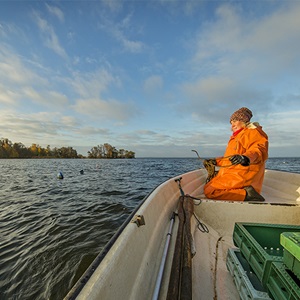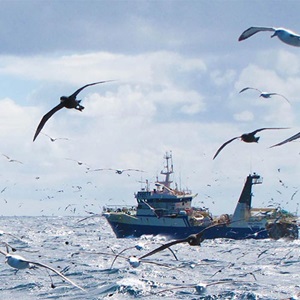Every few years we review the MSC Standards so they remain relevant. Industry practices and scientific understanding evolve over time, so our Standards need to evolve too.
Our Standard reviews are consistent with best practice codes and guidelines provided by the UN Food and Agriculture Organization (FAO), ISEAL and the Global Sustainable Seafood Initiative (GSSI). These reviews engage academics, fellow NGOs, governments and industry.
Reviewing our Standards
The Chain of Custody Review
This enables us to respond to stakeholder concerns, market changes and advances in supply chain traceability best practice.
We launched a review of the Chain of Custody Standard in September 2023.
The Fisheries Standard Review
The latest version of our Standard (version 3.0) was published in October 2022 following the most comprehensive review to date. The next Standard review will start within five years of this publication, by October 2027.
Find out more about our new Standard.
The Fisheries Standard Review considers issues raised by stakeholders and data from our own monitoring and evaluation team. The aim of this review is to make sure scientific developments and fisheries management best practice are reflected in MSC certified fisheries.
This review might also look at what we call the scope of the Fisheries Standard: what types of fishing activity can be assessed to the Standard.
Engage in our consultations
Review of other policies and processes
The Fisheries Certification Process Review
The Fisheries Certification Process is the instruction manual for Conformity Assessment Bodies (CABs) and defines the processes they must follow when assessing a fishery against the Fisheries Standard.We review the Fisheries Certification Process every two to three years. This process reviews how academics, fellow NGOs, governments and industry are involved in fishery assessments. We also look at improving the efficiency of the assessment process.
The latest review was completed in 2022, alongside the review of our Fisheries Standard.
Find out how the Fisheries Certification Process has changed.Labour Policy Review
The Marine Stewardship Council condemns the use of forced or child labour and we seek to mitigate risks in our supply chains and fisheries, but we remain an environmental standard setter.
To better ensure the absence of egregious labour practices from certified businesses, we have established a separate Social Policy team that is carrying out a Labour Policy Review. This will involve consultation of stakeholder and the development of eligibility criteria for MSC certified businesses.
The first MSC Labour Eligibility Requirements document was published in October 2022.
How does Standard development work?
- The MSC develops the MSC Fisheries, Seaweed and Chain of Custody Standards over time. We also regularly develop the process that certifiers use to assess fisheries and supply chain companies against our Standards.
- An issue is put forward by a stakeholder or is raised by the MSC.
- Issues are reviewed by the MSC, and some are taken forward. These issues are investigated by the MSC through research and a process of public consultation and stakeholder workshops.
- The issue and proposals to develop the program are discussed by two groups:
- The MSC's Technical Advisory Board, an independent panel of experts.
- The Stakeholder Advisory Council, a council of MSC’s stakeholder groups and independent representatives. - These two groups provide advice and make recommendations to the Board of Trustees about the proposals. The Board of Trustees makes the final decision on whether to adopt developments into the program.
Get involved
Hundreds of people have been involved in shaping our Standards. Your expertise and insights can contribute to the development of the MSC Fisheries and Chain of Custody Standards.
There are two main ways to get involved in the Standard development process – you can identify an issue, or you can give feedback on an issue that's open for consultation.
Identify an issue
If there is some way you think our Standards or our certification system need to develop, please send us an email with as much detail as possible to [email protected].
How does the MSC respond to an issue?
- An issue is put forward by a stakeholder or is raised by the MSC.
- Issues are reviewed by the MSC, and some are taken forward.
- Issues are investigated by the MSC through dedicated research, evaluation and a process of public consultation and stakeholder workshops.
- Proposed revisions are tested to understand impact and usability.
- The issue is taken to the MSC Technical Advisory Board (TAB), an independent panel of experts. They review and make recommendations to the Board of Trustees. It is also taken to the Stakeholder Advisory Council (STAC) who advise on issue development. This council is made up of fisheries, supply chain companies and eNGOs.
- The program improvement must be accepted by the TAB and adopted by the Board, before being implemented.
What happens when you raise an issue?
We carefully assess every issue and decide if and when it enters into our development process.
How long does it take for issues to be resolved?
It takes time to make modifications to our Standards. Reasonable timeframes need to be allowed to give the issue due consideration and consultation, and ensure any changes are tested and implemented.
We also need to monitor and evaluate any changes that are introduced to make sure implementation is successful in achieving the intended outcome.
To make sure fisheries can adapt to changes they must be given time. The MSC is committed to the FAO Ecolabeling guidelines. These state that fisheries are given at least three years to adapt to changes to the Standard.
What happens after you give feedback in a consultation?
MSC staff consider every response we receive as we develop proposals. Your responses are read by the Technical Advisory Board and inform their recommendations.
All responses we receive are published anonymously.
We also provide a summary response to key issues raised. At the end of the project, we will provide an evaluation of the process including a summary of how main feedback themes were incorporated into revisions.
For copies of reports from past public consultations, please email [email protected]




.tmb-labelhome.jpg?Status=Master&sfvrsn=b79cdcf3_4)





